We may not have the course you’re looking for. If you enquire or give us a call on +08000201623 and speak to our training experts, we may still be able to help with your training requirements.
Training Outcomes Within Your Budget!
We ensure quality, budget-alignment, and timely delivery by our expert instructors.
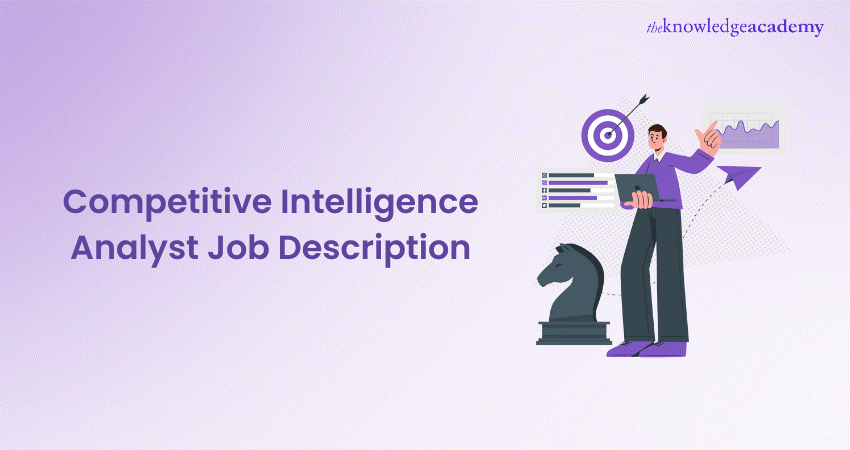
Welcome to a comprehensive exploration of the Competitive Intelligence Analyst Job Description. Gaining a competitive edge is vital, and the role of a Competitive Intelligence Analyst is central to achieving this goal.
Moreover, unlocking the insights behind the Competitive Intelligence Analyst’s Job Description plays a vital role. In this blog, you will learn more about the Competitive Intelligence Analyst Job Description and how such an analyst plays a crucial role in helping companies make better-informed business decisions.
Table of Contents
1) What is a Competitive Intelligence Analyst?
2) Qualifications for a Competitive Intelligence Analyst role
3) Responsibilities of a Competitive Intelligence Analyst
4) Salary and prospects for Competitive Intelligence Analysts
5) Essential skills for a Competitive Intelligence Analyst
6) Industries that employ Competitive Intelligence Analysts
7) Competitive Intelligence Analyst Job Description example
8) Conclusion
What is a Competitive Intelligence Analyst?
A Competitive Intelligence Analyst is a strategic thinker and information virtuoso dedicated to deciphering the domain of business competition. Armed with a keen analytical mindset, this professional possesses the skills to meticulously gather, assess, and interpret data from various sources.
Now, their primary mission is to unravel the mysteries of the competitive arena, providing organisations with a roadmap to navigate challenges and seize opportunities. Communication is a cornerstone of their role, as they translate intricate data analyses into compelling narratives for stakeholders.
Whether crafting comprehensive reports or delivering impactful presentations, CI Analysts bridge the gap between raw information and informed decision-making. Adaptability and a thirst for industry knowledge are defining traits, as the landscape of competitive intelligence is ever-evolving.
In a world where information is power, Competitive Intelligence Analysts are the architects of competitive advantage, guiding organisations through the intricacies of the business battlefield.
Qualifications for a Competitive Intelligence Analyst role
A Competitive Intelligence Analyst is a highly skilled professional with a robust blend of analytical prowess, technical acumen, and strategic insight. Possessing a bachelor's or advanced degree in business, finance, marketing, or a related field, these analysts typically demonstrate proficiency in data analysis tools, statistical methodologies, and industry-specific knowledge.
Critical thinking and problem-solving skills are paramount, allowing them to navigate the complexities of competitive landscapes and distil meaningful insights from vast datasets. Technical proficiency extends to familiarity with Competitive Intelligence software and emerging technologies, ensuring they can harness the power of advanced tools for efficient analysis. Excellent communication skills, both written and verbal, enable them to convey complex findings in a clear, concise manner to diverse stakeholders.
Moreover, continuous learning is ingrained in the profile, as staying abreast of industry trends, market dynamics, and emerging technologies is essential for the success of a Competitive Intelligence Analyst in providing informed strategic guidance to organisations.
Unlock insights and drive smarter decisions! Apply now for the Business Intelligence Analyst position and help transform data into actionable business strategies.
Responsibilities of a Competitive Intelligence Analyst
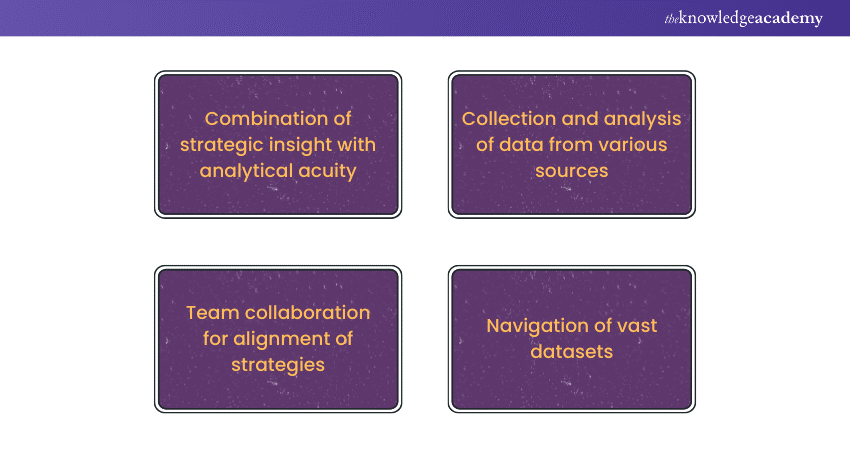
A Competitive Intelligence Analyst shoulders a multifaceted role, blending strategic insight with analytical acuity to provide organisations with a competitive edge. At the forefront of their responsibilities is the continuous monitoring of competitors and industry trends.
This involves collecting and analysing data from diverse sources, unravelling the nuances of market dynamics, and deciphering the strategic moves of competitors. Now, strategic planning is a core function, as CI Analysts translate their insights into actionable recommendations for organisational decision-makers.
Moreover, they actively contribute to the formulation of strategic plans, collaborating with cross-functional teams to align business strategies with the competitive landscape. Reporting and communication skills are pivotal, with CI Analysts crafting insightful reports and delivering presentations that distil complex information into comprehensible narratives.
Regular updates to stakeholders on changes in the competitive market are essential, ensuring that decision-makers are well-informed. In addition to these primary functions, CI Analysts are adept at utilising a variety of data analysis tools and technologies.
They navigate vast datasets, employing statistical and quantitative analysis to uncover patterns and trends that inform strategic decision-making. This multifaceted role positions Competitive Intelligence Analysts as indispensable architects of informed and strategic business choices in the competitive marketplace.
Ace your next interview! Prepare with these top Competitive Intelligence interview questions.
Salary and prospects for Competitive Intelligence Analysts
Candidates vying for the Competitive Intelligence Analyst job post will benefit from understanding the salary and role prospects of the profession. Here are the further details pertaining to the Competitive Intelligence Analyst role:
Salary for Competitive Intelligence Analysts
Here are the various salaries for Competitive Intelligence Analysts:
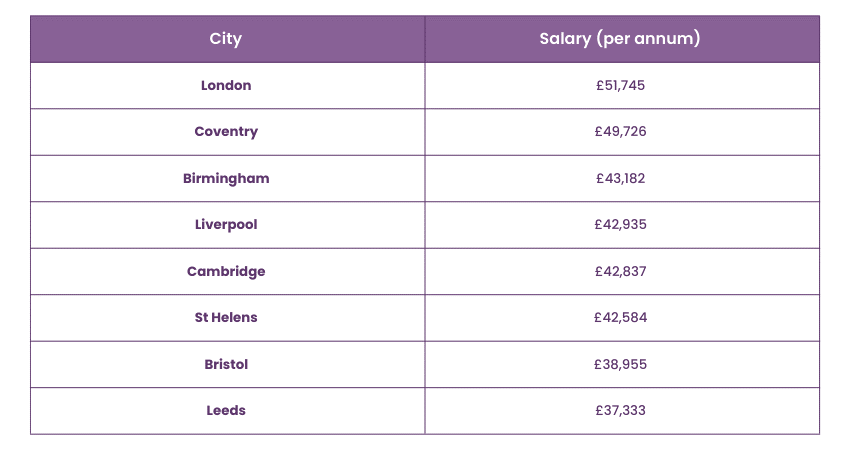
Prospects for Competitive Intelligence Analysts
The prospects for Competitive Intelligence Analysts are exceptionally promising, driven by the increasing recognition of the strategic importance of competitive intelligence across industries. Here are the many prospects for such analysts explained in detail:
a) Rising demand across industries: The pervasive nature of competition means that companies in various sectors, including technology, finance, healthcare, and manufacturing, recognise the need for dedicated Competitive Intelligence Analysts.
This demand is driven by the imperative to stay ahead in innovation, optimise strategies, and make well-informed decisions in an environment characterised by constant change.
b) Emphasis on data-driven decision-making: As organisations increasingly prioritise data-driven decision-making, the role of CI Analysts becomes even more critical. The ability to analyse and interpret vast datasets, combined with strategic thinking, positions CI
Analysts are key contributors to companies' decision-making processes. This emphasis on data-driven insights aligns with the broader trend of leveraging analytics to gain a competitive advantage.
Unlock the power of data with the latest Business Intelligence platforms. Find the right solution for your business!
c) Integration of technology: The integration of advanced technologies, such as artificial intelligence and machine learning, is reshaping the landscape of competitive intelligence.
CI Analysts who possess the skills to harness these technologies for enhanced data analysis and predictive modelling will be particularly sought after. The automation of routine tasks allows analysts to focus on higher-level strategic thinking and interpretation of results.
d) Globalisation and market expansion: With businesses expanding globally, the need for insights into international markets and diverse competitive landscapes is growing. Competitive Intelligence Analysts who can navigate the complexities of global markets, understand cultural nuances, and track geopolitical factors will be in high demand.
This trend is particularly relevant for multinational corporations seeking a comprehensive understanding of regional and global competitive dynamics.
e) An evolving regulatory landscape: The ever-evolving regulatory environment poses challenges and opportunities for organisations. CI Analysts with a deep understanding of industry-specific regulations and compliance issues and the ability to anticipate regulatory changes will be essential. Navigating these complexities ensures that businesses can adapt their strategies in anticipation of regulatory shifts.
Apply algorithms to automate your tasks by signing up for our Artificial Intelligence Tools Training now!
Essential skills for a Competitive Intelligence Analyst
In Competitive Intelligence, a Competitive Intelligence Analyst must possess a diverse skill set to navigate the complexities of the business domain effectively. Here are five key skills that distinguish a proficient CI Analyst:
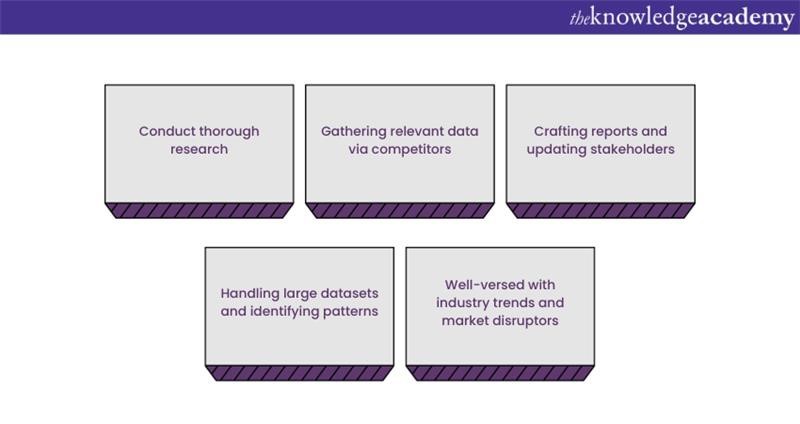
Research skills
A fundamental pillar of a Competitive Intelligence Analyst's skill set is the ability to conduct thorough and effective research. This involves not only sourcing information from traditional outlets but also staying attuned to emerging trends in the industry.
Exceptional research skills enable these analysts to gather relevant data about competitors, market trends, and other pertinent factors shaping the business environment. This skill is not only about the quantity of information gathered but also the ability to discern the most valuable and actionable insights from the vast sea of data available. A keen eye for detail and a methodical approach to information gathering are critical for success in this aspect of the role.
Master the competitive landscape! Learn the step-by-step Competitive Intelligence process to stay ahead.
Communication skills
A CI Analyst basically acts as a bridge between raw data and informed decision-making, making effective communication skills indispensable. Whether crafting comprehensive reports, delivering presentations, or regularly updating stakeholders, the ability to convey complex findings in a clear and compelling manner is paramount.
Now, written communication skills come into play when documenting insights and recommendations, ensuring that the information is accessible and actionable for various audiences within the organisation.
Additionally, strong verbal communication skills are vital for presenting findings to leadership or collaborating with cross-functional teams. The power of storytelling through data is a hallmark of a skilled CI Analyst, enabling them to influence decision-makers with the insights derived from their analyses.
Discover the top tools for effective Competitive Intelligence. Enhance your strategic decision-making!
Data analysis skills
At the heart of competitive intelligence lies the ability to transform raw data into meaningful insights. Proficiency in data analysis tools, statistical methodologies, and quantitative analysis is crucial for a CI Analyst.
Additionally, they must be adept at handling large datasets, identifying patterns, trends, and anomalies, and extracting valuable information that informs strategic decision-making. Whether employing data visualisation techniques to make complex data more accessible or utilising advanced analytics tools, a CI Analyst's prowess in data analysis is foundational to their role.
This skill involves not only technical proficiency but also the capacity to interpret data within the context of the business environment, providing actionable insights for strategic planning.
Stay ahead of the competition! Learn what Competitive Intelligence is and why it's crucial for business success.
Strategic thinking
Competitive Intelligence Analysts are strategic thinkers who contribute significantly to an organisation's long-term success. This skill involves the ability to connect the dots between various pieces of information, foresee potential challenges, and identify opportunities that align with the organisation's goals.
Strategic thinking encompasses a forward-looking mindset, enabling analysts to anticipate market shifts and competitor moves. By integrating their insights into the broader strategic planning process, CI Analysts play a pivotal role in shaping the trajectory of the organisation. This skill requires a holistic understanding of the business and industry dynamics and the foresight to recognise how external factors may impact the organisation's competitiveness.
Uncover how Business Intelligence can transform your data into actionable insights. Learn more now!
Industry knowledge
A thorough understanding of the industry in which an organisation operates is a cornerstone of effective competitive intelligence. This skill extends beyond basic knowledge of the market and requires continuous learning to stay abreast of industry trends, regulatory changes, and emerging technologies.
CI Analysts need to be well-versed in the nuances of their industry, including key players, market dynamics, and potential disruptors. This knowledge forms the context within which they analyse data and provide strategic recommendations.
Industry knowledge enables CI Analysts to identify both challenges and opportunities, contributing to a more informed and proactive approach to competitive intelligence.
Learn the tools to harness the power of data by signing up for our Generative AI for Data Analyst Training now!
Industries that employ Competitive Intelligence Analysts
Competitive Intelligence Analysts play a crucial role across diverse industries, contributing their skills to enhance strategic decision-making and maintaining a competitive edge. Here are a few examples of how CI Analysts operate in various sectors:
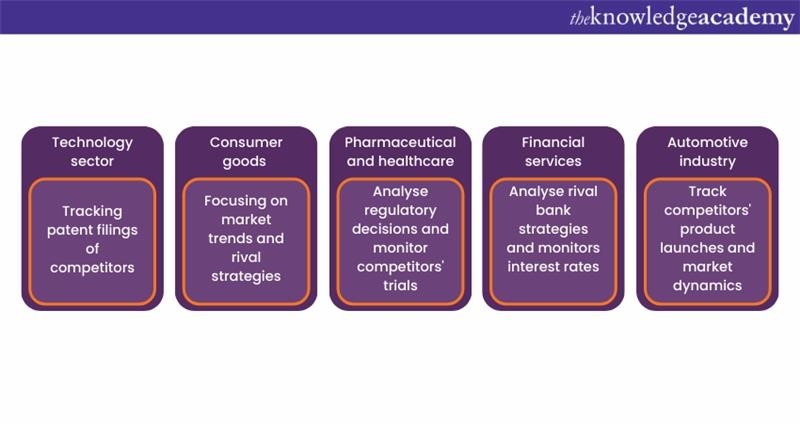
Technology sector
In the fast-paced world of technology, CI Analysts are instrumental in monitoring competitors' product launches, partnerships, and technological advancements. For instance, a CI Analyst in a leading tech company might track the patent filings of competitors, analyse their research and development initiatives, and assess emerging trends in the industry. This information not only helps the company stay ahead in innovation but also aids in formulating strategies to counteract potential competitive threats.
Consumer goods industry
In the consumer goods sector, CI Analysts focus on market trends, consumer preferences, and the strategies of rival companies. For example, a CI Analyst in a beverage company might analyse the marketing campaigns of competitors, assess the impact of changing consumer preferences on product sales, and monitor supply chain dynamics. This information allows the company to adjust its product offerings, marketing strategies, and distribution channels to maintain or improve market share.
Pharmaceutical and healthcare
In the pharmaceutical and healthcare industry, CI Analysts play a vital role in tracking developments related to drug pipelines, regulatory changes, and market entry strategies. A CI Analyst in a pharmaceutical company might closely monitor competitors' clinical trials, analyse regulatory decisions, and assess potential collaborations or acquisitions in the industry. This intelligence informs strategic decisions regarding research and development priorities, regulatory compliance, and competitive positioning.
Financial services
In the financial services sector, CI Analysts focus on market trends, regulatory changes, and the competitive landscape. For example, a CI Analyst in a banking institution might analyse the expansion strategies of rival banks, assess the impact of new financial regulations, and monitor changes in interest rates. This information is crucial for adapting the institution's service offerings, optimising risk management practices, and identifying potential opportunities for growth or diversification.
Automotive industry
In the automotive sector, CI Analysts track competitors' product launches, technological innovations, and market share dynamics. A CI Analyst in an automotive company might analyse the supply chain strategies of competitors, assess the adoption of electric vehicle technologies, and monitor global market trends. This intelligence guides decisions related to product development, manufacturing processes, and market positioning.
Utilise data to devise solutions by signing up for our Business Intelligence Reporting Course now!
Competitive Intelligence Analyst Job Description example
Below is an example of a Competitive Intelligence Analyst’s Job Description:
Do you want an opportunity to effect change at a leading technology organisation?
Do you enjoy staying on top of the competitive landscape shaping business and technology buying decisions?
Join our Competitive Intelligence Team
Our team focuses on understanding market trends and the competitive landscape to improve Akamais go-to-market strategy. Executives, sales, marketing, and product leaders rely on us to provide them with insight. Insight into how competitors position, message, package, and sell their solutions and recommendations to overcome those challenges.
Partner with the best
You'll be the technical resource for the Product Marketing organisation and the intelligence service for senior management. You will Collaborate closely with Product and Sales. You'll be providing competitive analysis and educating us on how to best position our solutions. You'll also craft rapid responses for industry or competitor market events. Creating sales tools that help set our GTM strategy apart.
As a Senior Competitive Intelligence Analyst, you will be
a) Assessing and documenting Akamai's market position relative to our key competitors.
b) Engaging in the roadmap and GTM planning sessions for product roadmaps and helping guide customer product experience.
c) Building training material for field teams (e.g. battle cards) on product and technical capabilities for product releases.
d) Mining competitive differentiation from competitors, internal data sources and experts, and conducting knowledge sharing with relevant teams.
Do what you love
To be successful in this role, you will:
a) Have relevant experience and an educational study in Product Marketing and/or a Technical field or its equivalent.
b) Have experience working in the security market, specifically Zero Trust.
c) Have excellent verbal and written communication with the ability to translate technical features into training, documentation, and presentations.
d) Be capable of optimising development and documentation processes.
e) Have experience working in a matrix environment with excellent communication and collaboration skills to build trusting relationships.
f) Be action-oriented, capable of multi-tasking well, and able to thrive in a dynamic team environment.
Work in a way that works for you
FlexBase, Akamai's Global Flexible Working Program, is based on the principles that are helping us create the best workplace in the world. When our colleagues said that flexible working was important to them, we listened. We also know flexible working is important to many of the incredible people considering joining Akamai. FlexBase gives 95% of employees the choice to work from their home, their office, or both (in the country advertised). This permanent workplace flexibility program is consistent and fair globally to help us find incredible talent virtually anywhere. We are happy to discuss working options for this role and encourage you to speak with your recruiter in more detail when you apply.
Learn what makes Akamai a great place to work
Connect with us on social and see what life at Akamai is like!
We power and protect life online by solving the toughest challenges together.
At Akamai, we're curious, innovative, collaborative and tenacious. We celebrate diversity of thought, and we hold an unwavering belief that we can make a meaningful difference. Our teams use their global perspectives to put customers at the forefront of everything they do, so if you are people-centric, you'll thrive here.
Working for you
At Akamai, we will provide you with opportunities to grow, flourish, and achieve great things. Our benefit options are designed to meet your individual needs for today and in the future. We provide benefits surrounding all aspects of your life:
a) Your health
b) Your finances
c) Your family
d) Your time at work
e) Your time pursuing other endeavours
Our benefit plan options are designed to meet your individual needs and budget, both today and in the future.
About us
Akamai powers and protects life online. Leading companies worldwide choose Akamai to build, deliver, and secure their digital experiences, helping billions of people live, work, and play every day. With the world's most distributed computing platform from cloud to edge, we make it easy for customers to develop and run applications while keeping experiences closer to users and threats farther away.
Join us
Are you seeking an opportunity to make a real difference in a company with a global reach and exciting services and clients? Come join us and grow with a team of people who will energise and inspire you!
Akamai Technologies is an Affirmative Action, Equal Opportunity Employer that values the strength that diversity brings to the workplace. All qualified applicants will receive consideration for employment and will not be discriminated against on the basis of gender, gender identity, sexual orientation, race/ethnicity, protected veteran status, disability, or other protected group status.
Curious about a Business Intelligence Analyst’s earning potential? Check out the latest salary trends in your area!
Conclusion
In conclusion, the business industry demands adept professionals who can decode complexities and provide actionable insights. The Competitive Intelligence Analyst Job Description showcases the pivotal role these experts play in shaping strategic decisions, ensuring organisations thrive in the competitive arena through informed and proactive approaches.
Frequently Asked Questions
Upcoming Office Applications Resources Batches & Dates
Date
 Business Objects Web Intelligence Reporter Course
Business Objects Web Intelligence Reporter Course
Thu 1st Jan 1970







 Top Rated Course
Top Rated Course



 If you wish to make any changes to your course, please
If you wish to make any changes to your course, please


